-
 Art of Wellness Acupuncture & Traditional Chinese Medicine (TCM)11704 Wilshire Blvd, Suite 295, Los Angeles, CA, 90025
Art of Wellness Acupuncture & Traditional Chinese Medicine (TCM)11704 Wilshire Blvd, Suite 295, Los Angeles, CA, 90025
myartofwellness@gmail.com310-451-5522 Office Hours
MonClosedTue7:30 am --4 pmWed7:30 am --4 pmThu7:30 am -- 4 pmFri7:30 am -- 4 pmSat7:30 am -- 4 pmSunClosedOur office opens from Tuesdays to Saturdays 7:30 am to 4 pm, will be closed on Memorial day, Independent day, Labor day, Thanksgiving day, Christmas and New year.
-
Recent Posts
- Acupuncture and TCM Treatment for Perimenopause Symptoms
- How to Treat Insulin Resistance With Acupuncture and TCM
- How to Treat Metabolic Syndrome With Acupuncture and TCM
- How to Treat Syncope With Acupuncture and TCM
- How to Treat Thoracic Outlet Syndrome With Acupuncture and TCM
- How to Treat Dupuytren’s Contracture With Acupuncture and TCM
- How to Treat Nutcracker Syndrome With Acupuncture and TCM
- How to Treat Rosacea With Acupuncture and TCM
- How to Treat Perioral Dermatitis With Acupuncture and TCM
- Lymphatic Drainage With Acupuncture and TCM
- How to Treat Turf Toe With Acupuncture
- How to Treat Nerve Pain With Acupuncture and TCM
- How to Treat Watery Eyes With Acupuncture and TCM
- How to Treat Ovarian Cysts With Acupuncture and TCM
- How to Treat Dystonia With Acupuncture and TCM
- Can Acupuncture Help Bad Breath?
- Sign up to receive news and updates and get my free report:“The Top 10 Reasons to Try Acupuncture”

November 2025 M T W T F S S 1 2 3 4 5 6 7 8 9 10 11 12 13 14 15 16 17 18 19 20 21 22 23 24 25 26 27 28 29 30
Immune System
How to Treat Candida With Acupuncture and TCM
By Xiaomei Cai, L.Ac., Ph.D., & Qineng Tan, L.Ac., Ph.D.
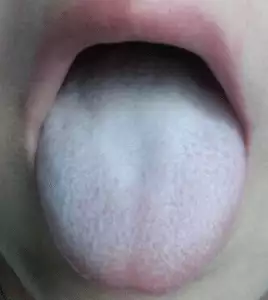
Why do I keep getting yeast infections? White patches on the tongue? It could be the common fungal infection Candida, also known as Candidiasis or a yeast infection. Candida infection can happen to people of all ages and in different parts of the body. Acupuncture and TCM Chinese herbs can help resolve recurrent yeast infections and thrush in the mouth.
Candida albicans, the species of candida fungus that most often causes candidiasis, is a type of yeast that naturally exists in the human body. When the population of candida is kept to normal levels, it causes no harm; in fact, it acts to help digestion and the absorption of nutrients from food. But when proliferation of the fungus gets out of control, candida can cause burning pain, redness and inflammation, and difficulty with normal processes like eating, digestion, and elimination. In extreme cases, candidiasis can cause serious illness.
Candida overgrowth most often happens in the mouth (known as “thrush”), or in the genital area (usually called a “yeast infection”). Thrush in babies’ mouth commonly affects very young infants, creating white or yellow patches or sores in and around the mouth that can affect feeding. Thrush in adults is less common, but can occur when someone’s immune system is weak (common among people living with HIV/AIDS), or if they wear dentures or use medications for dry mouth, causing the typical white patches, cracks in the corners of the lips, and burning sensations in and around the mouth and throat.
Most women have probably experienced a vaginal yeast infection at some point in their lives. This type of candida causes burning and itching in the vulva and vagina along with a white, clumpy discharge. Candidiasis can also affect men, causing an itchy rash on the penis.
Is candida or thrush contagious? It’s rare for a person to “catch” a fungal infection from another person, but it is possible, for example, for a person to pass a yeast infection to his or her partner through sexual contact. It is also possible for a mother to develop thrush on her nipples from nursing her baby who has oral candidiasis.
Candida overgrowth can affect other parts of the body, including the finger or toe nails (candidal paronychia), and especially areas of the skin that tend to be damp and sweaty, like the armpits or the creases around the groin.
In some cases, invasive candidiasis can get deeper into the body, infecting the gastrointestinal system or even getting into the bloodstream, which can lead to infection of various organs, including the eyes, heart or kidneys. This type of candida infection can become serious, causing fever, and even sepsis, which can be fatal.
Candida overgrowth creates different problems for different people. That is why TCM, acupuncture, and herbal medicine provide an excellent way to treat candida. TCM theory of candidiasis treatment allows for a highly individualized approach to each patient, so that we can get rid of yeast infections for good.
Top 5 Types of Candida Infection

Candida overgrowth can occur in different parts of the body. The most common kinds of yeast infection or candida are:
- Oral candidiasis – also known as thrush in mouth, or yeast infection in the mouth. Thrush in babies usually occurs because the infection passes from the mother’s vaginal area to the baby during birth, and the infant’s immune system is not developed enough to fight it. What thrush on tongue looks like: white patches that can be wiped off.
- Vaginal candidiasis – commonly known as a vaginal yeast infection, candidiasis of the female genitals causes redness, burning, and “cottage cheese-like” discharge.
- Candidal balanitis – candida infection of the male genitals happens particularly in uncircumcised men. More recent research has led some medical professionals to believe that fungal infections may cause a prostate problem, infection in prostate, prostatitis symptoms, enlarged prostate symptoms, and symptoms to prostate cancer.
- Cutaneous candidiasis – or yeast infection on skin. Candida can cause diaper rash in babies, and red, itchy, peeling patches in areas where the skin has many folds and creases. Candidiasis can also infect the fingernails, toenails and nail beds.
- Invasive candidiasis – When candida gets into the digestive tract or bloodstream, it can cause a serious systemic infection that affects the blood, heart, brain, esophagus, and/or digestive tract. This happens most often in people with compromised immune systems, especially people with HIV or who are undergoing chemotherapy for cancer.
Candida overgrowth can also lead to symptoms of fatigue, chronic allergies, chronic sinusitis or post-nasal drip. Central nerve damage, constant irritability, and chronic fatigue syndrome are all signs that a person may have a deep candida infection.
What Causes Candida?
Candida yeasts are present in every human body. What causes candidiasis is abnormal fungal overgrowth due to a lack of friendly bacteria or a weakened immune system. Women often get yeast infections during pregnancy because of changes in the balance of bacteria in their pelvic area. Antibiotics, steroids, birth control pills, and chemotherapy drugs can all contribute to candidiasis by affecting the gut flora. Just a few rounds of antibiotics can destroy all of the healthy bacteria we need to maintain proper balance. Personal habits and hygiene mishaps, like wearing too-tight pants or the same sweaty workout clothes all day, can also lead to yeast infections. Food choices can also play an important role in whether or not a person is prone to yeast infections. It may be recommended that people go on a “candida cleanse” or special candida diet to help stop the candida overgrowth.
How Do You Treat Candida?

Often a mild case of candidiasis in the mouth will go away within a few weeks on its own. If oral thrush treatment is needed, a doctor may prescribe antifungal nystatin drops, mouthwash, or lozenges.
Cutaneous candida (skin infection), vaginal yeast infections, and male genital infections will usually be treated with antifungal medications such as Fluconazole, which can be taken orally, or topical antifungal creams like Nystatin.
These antifungals may help to alleviate the symptoms of candidiasis by stopping the yeast overgrowth. However, for many people who experience recurrent yeast infections, they are only a temporary solution. Frequent use can build up an antifungal resistance. When candida keeps coming back, there is surely a deeper cause for the ongoing yeast infections.
Azoles and other types of antifungal medications are used to stop the growth of the candida in patients with invasive candidiasis. Unfortunately, they can also be toxic to other organs, like the kidneys. For people who are already in poor health, these medications may cause more harm.
Acupuncture and TCM provide a method for dealing with candidiasis while improving immune function, and revitalizing the health of the skin, reproductive organs, digestive tract, or whatever parts of the body are affected by candida overgrowth.
How Can Acupuncture Help Candida?
In TCM philosophy, the spleen and stomach play important roles in digestion, especially the transformation of one fluid into another, and the movement of fluids through the digestive and eliminative organs. Basically, in TCM, the spleen is responsible for turning what we eat and drink into healthy blood and Qi (life force energy). When the spleen and stomach are weak and not working well, excess fluid builds up and encourages the candida yeasts to reproduce.
Candida is considered to be caused by spleen/stomach deficiency and dampness. When dampness collects in the pelvic region, it creates phlegm and leads to congestion and heaviness. This is what can lead to vaginal yeast infections or a prostate problem in men.
In other cases, the improper functioning of the stomach causes heat and fire to develop in the upper part of the body, which can cause thrush in the mouth, or the kind of invasive candidiasis that affects the heart.
Your acupuncturist will work to improve spleen and stomach function to restore balance of the intestinal flora with a combination of acupuncture, customized herbs, and a complete nutritional analysis to create an appropriate diet to cleanse candida from the system.
Acupuncture treatment will strengthen and tonify the spleen and other organs. Herbs can be used internally and externally to help relieve candidiasis. TCM formulations that have developed over many centuries are known to have antifungal and antibacterial properties.
Several studies have demonstrated the efficacy of using herbs in external forms for women’s genital infections. Using herbs via steam, hip bath, or douche bypasses the digestive system so that the herbs can directly help to reduce inflammation and discharge.
Top 5 Candida Diet Tips

A TCM practitioner will focus on creating and implementing a food program that helps to clear dampness from the body. Candida infection tends to occur when the body is more acidic. A diet that is high in refined sugars and meats and low in vegetables tends to create a lower PH level (below 7). Eating more dark green leafy vegetables will help to make the body more alkaline. It is also very important to check behavioral habits that might be contributing to the yeast overgrowth.
- Avoid all refined sugars, sweeteners, sweets, and even fruits. These foods all cause the candida yeast to spread more quickly. Stay away from foods with yeasts in them, like bread, crackers, packaged cereals, and pretzels. Vinegar and alcohol should also be cut out of the diet until the situation improves.
- Avoid milk, cheese, eggs, and red meats, and emphasize instead lots of green vegetables. Chlorophyll (the phytonutrient present in all green leaves) is especially helpful for getting rid of candidiasis. Stay away from eating fungi, like mushrooms, and pickled vegetables.
- Eat more warm, cooked foods, especially soups and rice, which are easy to digest. Other helpful foods include orange and yellow winter squashes and daikon radish.
- Use a baking soda solution (1-2% solution) to douche or as a hip bath to help get rid of a vaginal yeast infection.
- Taking a high quality probiotic supplement can help to restore proper balance of the gut flora and control yeast growth.
Be sure to keep the skin in sensitive areas clean and dry, but avoid using harsh soaps or deodorants. Avoid too-hot showers or baths, especially in shared spaces. Always change out of wet bathing suits and workout clothes right away. Wear loose clothing made of natural fibers.
Find Acupuncture Near Me for Candida
It can be very frustrating to suffer with recurrent yeast infections. If you keep getting yeast infections, it may be time to try a different treatment to help get rid of them. New parents who are worried about thrush in babies may find that starting to work with a TCM provider offers a safe, natural alternative to antibiotics and other medications. You may discover that an integrative approach to solving problems with candidiasis works better in the long run than over the counter creams or prescriptions to get rid of candida.
*This article is for education from the perspective of Traditional Chinese Medicine only. The education provided by this article is not approved by FDA to diagnose, prevent, treat and cure human diseases. It should not stop you from consulting with your physician for your medical conditions. Traditional Chinese Medicine is based on Qi, which is an invisible force that usually cannot be observed by modern science. Because science focuses on testing ideas about the natural world with evidence obtained through observation, these aspects of acupuncture can’t be studied by science. Therefore acupuncture and Chinese herbs are often not supported by double-blind, randomized trials, and they are considered alternative medicine therapies in the United States.
How to Treat Hives With Acupuncture and TCM
By Qineng Tan, L.Ac., Ph.D. & Xiaomei Cai, L.Ac., Ph.D.
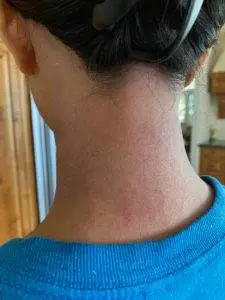
Skin rash with itchy welts or red bumps that seem to appear suddenly, then move to another part of the body, or go away? Hives, also known as urticaria, are caused by a type of allergic reaction that creates a temporary rash or swelling of the skin. TCM and acupuncture have been used for centuries to help relieve hives caused by allergies.
Hives are fairly common, occurring in about 20% of people of all ages. An acute, or short-lived, case of hives may occur because of being exposed to some unusual, new chemical or natural irritant in a person’s environment, maybe in some product, or some pollen or bug. These usually go away quickly, and it may be fairly obvious what it was that caused the outbreak of hives. However, sometimes people develop chronic idiopathic urticaria (CIU), in which a person may break out in hives often on an ongoing basis and have no idea why it keeps happening.
Allergies can manifest in many ways: sometimes causing sneezing, watery eyes, or skin problems. Hives are another way that an allergic reaction can show up. Hives, or urticaria, are distinguishable from other types of skin rash, like dermatitis eczema, or shingles rash, because, unlike other rashes, they do not form fluid-filled bumps or cause dryness, scaliness, or cracking of the skin. Rather, hives are raised welts on the skin that appear red, but then turn white when you press on them; this is known as “blanching.” Hives can look like small, narrow lines, or big, patchy blotches.
Urticaria is related to, and sometimes confused with, angioedema, which is a similar condition, in which deep layers of skin become swollen, often around the eyes and mouth, also due to irritation by some allergen. Angioderma can coexist with hives, and can be more dangerous than hives, if it causes tissues in the throat or tongue to become so swollen that the airway is blocked.
Hives often clear up on their own within a few days or weeks without any treatment. However, some people develop chronic hives, in which the hives rash keeps recurring for weeks or months, or longer. Chronic hives can be a uniquely painful and frustrating condition; never knowing when you might break out into a burning, itchy rash. Hives worse at night or hives worse after sleeping are common experiences for people who suffer from chronic urticaria. Breaking out in hives can make a person feel panic, making it very difficult to get on with daily tasks. Acupuncture treatment can help alleviate the burning and itching of acute hives or chronic hives, and help relieve the allergies, stress, and other underlying conditions that bring them on.

Top 10 Hives Causes or Triggers
In general, what causes hives most of the time is an allergic reaction to some external stimulus. Touching something, eating something, or inhaling something that you are allergic to can cause urticaria to break out on the skin, sometimes briefly, sometimes moving around from one area or the skin to another, or seeming to spread over the skin. Things that can cause hives include:
- Foods, especially those that are well-known allergens like nuts, shellfish, dairy, and eggs, but also fruits, especially citrus fruits
- Contact with certain plants
- Pollen in the environment
- Medications, including antibiotics, OTC pain relievers
- Latex
- Pet dander
- External stimuli from the climate – sun exposure, heat, cold
- Bacterial infections in the body, like strep throat or a UTI
- Viral infections in the body, like colds, hepatitis or mononucleosis (viral hives)
- Blood transfusions
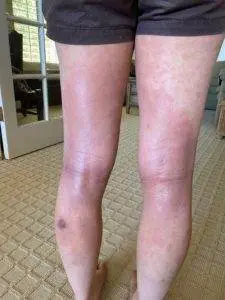
Insect bites or itchy rashes that cause you to scratch at your skin can also cause hives to appear in other areas. Simple pressure on the skin, from sitting or leaning on a patch of skin for a long time, can cause hives. Some people break out in hives when they are under a lot of pressure or emotional stress, even if they are not aware of having allergies or other underlying causes for hives. Sometimes this is called a “stress rash.”
Treatment for Hives
Hives are most commonly treated with antihistamines, which can help relieve itching. Many people experience some type of side effect from taking antihistamines, including: headache, drowsiness, fatigue, and hay fever type symptoms. Some people do get relief from a temporary hives rash after taking Benadryl or something similar. But for others, it may not help, and then doctors often prescribe a corticosteroid as an anti-inflammatory. If steroid treatment for hives does not help, immunosuppressants may be recommended. Depending on the root cause of the hives, these types of pharmacological solutions may or may not work to relieve hives. Acupuncture and TCM treatment focuses on solving the deeper problems that cause hives, without any negative side effects.
How Can Acupuncture Help Hives?

As we have seen, conventional western medicine mostly looks at hives in terms of allergies. But in order to resolve the hives, we have to look more closely at why a person has those allergies. Why are some people affected so strongly by certain foods or certain environmental conditions while other people are not affected at all? We have to consider a person’s constitutional health.
As we have discussed in other articles, in TCM the concept of Wei Qi refers to the body’s protective defenses, the action of which stems mainly from the lungs and the skin. Many types of illness are considered to be related to a weakness or breakdown in the Wei Qi that allows external pathogenic factors to enter the body and take hold. Wind is one such external pathogenic factor. Heat and cold are others. Viral and bacterial infections also find their way into the body when the Wei Qi energy is weakened.
6 Pathogenic Factors According to TCM:
- Wind
- Cold
- Summer Heat
- Dampness
- Dryness
- Fire
Hives come mostly from wind and heat. In TCM, urticaria is known as Feng Zhen Kuai, or “wind rash patch.” Wind describes the nature of urticaria rash in the sense that the hives welts come and go, as if blown about.
When people get hives, it is usually because of one of a few common factors.
- Yin deficiency/Dryness – If the body is too dry, when any allergens get in, there is not enough moisture in the body to wash them out of the system; this causes the breakout.
- Fire/Heat – If there is too much heat, fire, and inflammation in the body, when there is exposure to allergens, the body can’t take any more and will break out.
- Liver stagnation with Heat – When a person is under stress for a long time, it can exacerbate stagnation of Qi in the liver system, which over time causes heat to build up, then the body cannot process little irritations. The liver and kidneys have to do all the work to filter toxins out of the body, but when those organs are overstressed, the body will try to get rid of excess heat through the skin.
Usually, if a person is having chronic hives, it has a lot to do with their food and their habits around their exposure to the elements. For example, in the winter time, in order to be harmonious with the season, the body is meant to experience cold. But many people keep the heater on and keep their environment very warm all the time. This leads to dry air and can cause even people without any allergies to feel itchy. People also tend to take long, hot showers, which can destroy some of the skin’s natural protective layers and cause it to be raw and easily irritated.
In western thought, when a person has a reaction such as hives to certain foods (spicy foods, alcohol), it is thought of as an allergic reaction, but in Chinese medicine we see this as being the body’s reaction to too much heat. If a person already has a fiery constitution, or liver stagnation, and then there are external hot conditions, and hot foods coming in all at once, the internal heat can explode out, creating the burning rash on the skin.
Cupping can be very helpful for treating hives; it exfoliates the skin and helps to draw toxins out. This will help to cool down the hives outbreak. Then we go further with acupuncture and herbs to strengthen the lungs, the liver, and the Wei Qi.
A systematic review of clinical trials studying the use of TCM methods and acupuncture to treat hives, both as an alternative and an adjunct to medication treatment, concluded that acupuncture is a safe and effective way to reduce symptoms of hives or chronic urticaria. Chinese herbs are also well-known for helping to relieve hives.
Top 5 Tips for Hives Relief

How to get rid of hives for good will mean paying attention to what triggers the rash for each individual. To avoid this kind of allergic reaction hives, protect your Wei Qi with healthy habits. Prioritize rest and good nutrition to build up your immunity and protect your lungs and skin.
- Avoid a cold wind blowing on you, whether outside, or from a fan or air conditioner. Dress appropriately; always bring an extra layer so you don’t catch a chill or have a bright sun shining on your skin for a long time when you didn’t expect it.
- Avoid very hot showers, baths, saunas, etc.
- Engage in regular exercise to help boost your blood circulation; walking is always ideal. This will help to reduce stress, as will a meditation practice.
- Get plenty of rest. Good quality sleep is essential to help build up the Wei Qi.
- Avoid foods that are either too hot (spicy or fried, red meats) or too cold (raw foods). No alcohol or coffee. These triggering foods and beverages can really make the hives worse. Drink more water to eliminate the dryness in the body.
If a patient is having trouble figuring out what it is that is causing his or her hives breakouts, a TCM provider may be able to find the underlying reason behind the rash.
Acupuncture Near Me for Hives
People of all ages can receive acupuncture treatment for hives and allergies like hay fever. The doctors at Art of Wellness have been helping people get relief from allergies and itchy skin conditions for over three decades. We can provide help for children with hives with herbs and acupuncture. If you or someone you love is suffering from hives, please consider giving TCM and herbs a try.
*This article is for education from the perspective of Traditional Chinese Medicine only. The education provided by this article is not approved by FDA to diagnose, prevent, treat and cure human diseases. It should not stop you from consulting with your physician for your medical conditions. Traditional Chinese Medicine is based on Qi, which is an invisible force that usually cannot be observed by modern science. Because science focuses on testing ideas about the natural world with evidence obtained through observation, these aspects of acupuncture can’t be studied by science. Therefore acupuncture and Chinese herbs are often not supported by double-blind, randomized trials, and they are considered alternative medicine therapies in the United States.
How to Treat Shingles With Acupuncture and TCM
By Xiaomei Cai, L.Ac., Ph.D. & Qineng Tan, L.Ac., Ph.D.

Itchy, painful skin rash of blisters on one side of your torso? Burning rash on your face? These are the classic signs of shingles, also known as herpes zoster or varicella zoster, the same viral infection that causes chicken pox. Acupuncture and TCM treatment can calm the acute pain of the shingles rash and help it to heal more quickly, while also offsetting the nerve damage that can result from a herpes zoster infection.
Shingles most often affects older adults, but it can happen to people of all ages. Estimates suggest that one-third of all people will develop herpes zoster at some point in their lives. If you had chicken pox when you were younger, the virus still lives in your body, settling into the nerve tissue in the spinal cord near the brain. When the virus is somehow triggered, it can reactivate, creating a very painful, burning rash, usually in some small, localised area. While medical science hasn’t pinpointed exactly what causes the varicella virus to lie dormant and then reemerge, shingles is believed to be triggered in at least some cases by emotional and mental stress. Chronic stress can cause serious compromisation of the body’s immune system, allowing an old disease to take hold in the body again. People with autoimmune disease, cancer, or HIV may be at increased risk for developing shingles, as well as people who take medications, like steroids, that affect the immune system.
While shingles may go away on its own after a few to several weeks, there can be serious complications. If the rash develops on the face near the eyes, it can cause vision problems, even blindness. Some people develop postherpetic neuralgia (PHN), which can cause the burning, itching, and painful sensations to continue even after the rash on the surface of the skin has cleared up. Neuralgia is basically synonymous with neuropathy, a condition in which nerve cells have been damaged, causing tingling and pain.
If shingles lesions appear near the ears, or affect the facial nerve that connects to the ears, it can lead to Ramsay Hunt syndrome (RHS), also known as herpes zoster oticus, which can cause dizziness or vertigo, earaches, ringing in the ears (tinnitus), and even hearing loss. Other potential complications of shingles include pneumonia and encephalitis (swelling in the brain).
Acupuncture can be an effective alternative or adjunct to conventional medications for helping to relieve the intense acute pain of the shingles rash in the short term, and can also be used to help prevent and alleviate the potential long-term effects of shingles, like postherpetic neuralgia.
Top 5 Symptoms of Shingles

Usually before a shingles rash is visible on the skin, the person will begin feeling a tingling or burning sensation in that area. This can last a few or several days before the rash breaks out.
The signs of herpes zoster include:
- A rash that develops in a stripe (sometimes called a “shingles band” or a dermatome) on one side of the torso, ribcage, or waist area, or on one side of the face near the eye or ear. The rash is red and blistered and causes a lot of pain, burning, and itching.
- Fever
- Headache
- Chills
- Stomach upset, stomachache, nausea, or vomiting
In some cases, the rash clears up on its own within a few weeks. However, because shingles can sometimes become more complicated, creating skin infections and other more serious conditions, it is advisable to seek help from your health care providers as soon as you suspect you might have it.
What Is the Treatment for Shingles?
Shingles is not a curable illness; it is the resurfacing of an old viral infection that pretty much has to run its course. Medical treatment usually involves a prescription for antiviral medication such as Acyclovir, which, if taken within the first few days, may help reduce the severity of the rash and lessen the time that it lasts. Management of shingles pain is mostly taken care of with over the counter pain medications like ibuprofen or acetaminophen, although a doctor may also recommend topical creams, possibly with corticosteroids.
While a person has an active shingles rash, he or she is contagious to other people who have not yet had a case of the chickenpox or the varicella zoster vaccine. This means that other people could contract chickenpox from exposure to the person with shingles; but another person can not get shingles from a person who has shingles. It is important to keep the rash covered, avoid touching and scratching it, wash your hands, clothes, and bedding frequently, and stay away from young children, pregnant women, and anyone who may be vulnerable to getting chickenpox.
How Can Acupuncture Help Shingles?

While the scientific understanding of how viruses spread and function in the human body is clearly still very much a work in progress, acupuncture and herbs have been used to help the condition we recognize as shingles for over a thousand years. TCM philosophy views shingles as being related mainly to heat and dampness. As acupuncturists, we see shingles generally presenting in one of three ways:
- Liver Fire – in this case, the rash will be very red and hot, with a burning sensation. This type of herpes zoster outbreak is probably related to a long period of emotional stress or overwork, possibly combined with an unhealthy diet or too much alcohol consumption. Treatment will focus on clearing the heat from the liver-gall bladder system and reducing inflammation. The next steps of care are to reduce stress and boost immune function.
- Damp Heat – this rash will look more like pus or fluid-filled blisters with a very thin skin. Draining dampness and heat from the body with acupuncture and herbs is indicated.
- Qi and Blood stagnation – this is more the sort of long-term infection that can lead to postherpetic neuralgia, and is related to older age and an overall weakened immune system, and is more likely to be compounded by fatigue and poor sleep. Treatment will focus on getting the qi and blood moving freely through the body again.
Your TCM practitioner will also give guidance about the best foods to add or avoid to help relieve shingles inflammation and nerve pain. In general, avoiding spicy foods, seafood, sugar, and alcohol is a good way to start.
In a research study that combined TCM treatment with medication therapy, the patients who received acupuncture had an extremely low incidence of developing PHN, while 30% of the patients who only received drug therapy ended up with some form of neuralgia and pain still present after three months. The people who had acupuncture healed more quickly and reported less need for painkillers, too.
Another study compared patients treated for shingles with a TCM protocol of acupuncture, herbs and moxibustion only, versus patients treated with antiviral pills, topical creams, and pain relievers. The patients who had acupuncture had a significantly higher overall effectiveness rate (97.7%) compared to the group taking medications (81.8%), with efficacy defined by resolution of pain and clearing of the shingles rash.
Acupuncture Near Me for Shingles
Acupuncture and herbs can be used safely, alone or as an adjunct therapy, to hasten healing of a herpes zoster rash and to prevent long-term nerve damage and pain due to neuralgia. TCM treatment can also work on the other, subtler symptoms of shingles, like headache and stomach upset, without the need for additional medications. Building the immune system back up, helping to repair and prevent nerve damage, and reversing the effects of stress that can trigger a shingles outbreak are other benefits of seeking acupuncture near me for shingles relief and recovery.
*This article is for education from the perspective of Traditional Chinese Medicine only. The education provided by this article is not approved by FDA to diagnose, prevent, treat and cure human diseases. It should not stop you from consulting with your physician for your medical conditions. Traditional Chinese Medicine is based on Qi, which is an invisible force that usually cannot be observed by modern science. Because science focuses on testing ideas about the natural world with evidence obtained through observation, these aspects of acupuncture can’t be studied by science. Therefore acupuncture and Chinese herbs are often not supported by double-blind, randomized trials, and they are considered alternative medicine therapies in the United States.
Chinese New Year 2021 Year of the Ox
By Qineng Tan, L.Ac., Ph.D. & Xiaomei Cai, L.Ac., Ph.D.
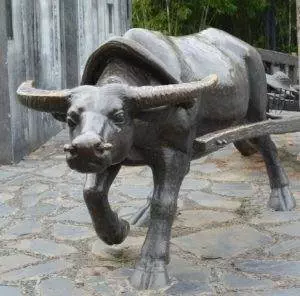
The Chinese New Year celebration will begin on February 12, 2021 this upcoming year. Throughout Asia, the start of the new year according to the lunar calendar is the most exuberant holiday, the time when families gather together to give gifts, eat special foods, honor long-held traditions, and show their love for one another. All around the world, the 2021 New Year holidays will look different, and many families will have to share their New Year greetings from afar. However, the new energy of the Metal Ox, according to Chinese Astrology, offers a way to view our situation with hope and purpose.
In Western astrology, your sun sign derives from the time of the year and place where you were born; whereas in Chinese Astrology, people who share an entire birth year also share a birth sign. The Chinese Astrological calendar runs through a twelve-year cycle.
The Ox is the second of the Chinese zodiac animals, following the Rat, who has been representative of 2020. (Looking back, we can see how the Rat’s frantic energy led to multiplying numbers, and tendencies to hoard.) Like this past year, ruled by the Metal Rat, the Ox is still influenced by the Metal element, which brings strength and steely resolve, but also rigidity, and a tendency to try to do things alone. The Ox, also known as the Cow, is all about hard work and persistence, so the Metal energy is complementary at a time when people, as individuals and as a global community, must work through intense difficulties with the ultimate diligence.
In TCM, the Metal element is considered to be connected in particular to the lungs and respiratory system. It cannot be overemphasized; top priority for the upcoming year must be taking care of your health, protecting and strengthening your Wei Qi (the Qi that helps prevent colds and flus), and getting plenty of rest. If you do not already have a regular practice of deep breathing and meditation in place, now is the time to begin.
Metal Ox, sometimes thought of as “Gold Ox,” or “Iron Ox,” is good at developing relationships, but does so with total, and sometimes brutal, honesty. She will demand truth and righteousness from others, too. In 2021, we have an opportunity to find new ways to build community even as we contemplate a world that feels more isolating than ever.
The metal Ox cannot be manipulated, but will charge straight ahead to tackle obstacles. Ox is ready to be tested; in fact, she relishes the chance to prove herself. On the other hand, Ox can be stubborn and unwilling to listen to alternative ideas that might call for a change of plans. Metal Ox is ready to put in the hard work, not because she seeks reward or accolades, but because without consistent effort, she knows nothing will get done or change. The overall energy of the Metal Cow is Yin, and associated with the cold months of Winter, when seeds and bulbs are buried underground, waiting and developing in quiet darkness.
Chinese Astrology, like Traditional Chinese Medicine, and Chinese philosophy in general, views the world through microcosm and macrocosm. That is, we see the entire universe represented in every living creature; and each individual, by creating harmony within, can help to create harmony in the universe as a whole. As we move into 2021, it feels especially necessary that we all take care of our bodies, our families, our communities, and by doing so, we extend that sense of taking care out to the whole world.
Top 3 Tips for Good Luck in the New Year

Are you an Ox? If so, this year is your “ben ming nian!” Literally translated as the “year of original destiny,” this is the term for when it is “your year;” in other words, the Zodiac sign matches that of the year you were born. It is generally believed that your ben ming nian can be a tumultuous year with a lot of ups and downs. People who want to ensure good luck during their Zodiac Year practice these habits for good fortune:
- Wearing Red – the color red is believed to chase away bad luck, so wearing even a little bit of red – red socks, red underwear – daily is advisable when it is your ben ming nian. However, there is one important point to remember; the red item must be given to you as a gift–not something you buy for yourself. So, now you know what to put on your holiday wish list if you’re an Ox: red accessories!
- Carry or Wear Jade – jade also has protective qualities, and is believed to help bring peace, harmony, and abundance to the wearer. It is common to see people always wearing a favorite pendant or bracelet made of jade.
- Avoid Facing “Tai Sui” – In Chinese Astrology, Tai Sui is a star that opposes Jupiter in the sky, and represents the “God of Age.” Some signs, including the ben ming nian, are in conflict with Tai Sui each year. Feng Shui principles give instructions as to how people who need to avoid “offending” Tai Sui can arrange their furniture so as not to cause unfortunate clashes.
Whatever your sign, the New Year is always a time to clean the house thoroughly, settle all accounts, and get organized so that the beginning of the year truly represents a fresh start.
Find Your Sign in Chinese Astrology
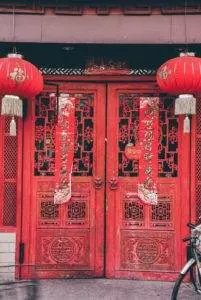
Because your Chinese sign is determined by the Lunar calendar, be sure to check the exact dates of your birth year. People born in January or February may belong to the former or later year.
- Ox 1937, 1949, 1961, 1973, 1985, 1997, 2009
- Tiger 1938, 1950, 1962, 1974, 1986, 1998, 2010
- Rabbit 1939, 1951, 1963, 1975, 1987, 1999, 2011
- Dragon 1940, 1952, 1964, 1976, 1988, 2000, 2012
- Snake 1941, 1953, 1965, 1977, 1989, 2001, 2013
- Horse 1942, 1954,1966, 1978, 1990, 2002, 2014
- Goat 1943, 1955, 1967, 1979, 1991, 2003, 2015
- Monkey 1944, 1956, 1968, 1980, 1992, 2004, 2016
- Rooster 1945, 1957, 1969, 1981, 1993, 2005, 2017
- Dog 1946, 1958, 1970, 1982, 1994, 2006, 2018
- Pig 1947, 1959, 1971, 1983, 1995, 2007, 2019
- Rat 1936, 1948, 1960, 1972, 1984, 1996, 2008
Seeds for the New Year Grow Into Conversations
At New Year’s parties–indeed, at any sort of gathering–you are bound to see a big bowl of unshelled sunflower seeds on the table. In China, people have been preparing seeds to be eaten as a shared snack for centuries. During the Yuan Dynasty (13th-14th century), people would stir-fry and eat melon seeds. Even though nowadays people almost always eat sunflower seeds instead, the common phrase for doing so in Chinese, 吃瓜, is still translated literally as “eating melon seeds,” or even simply “eating watermelon.” This phrase can also mean “gossiping,” because people love to nibble on the seeds while they chat with their friends and relatives.
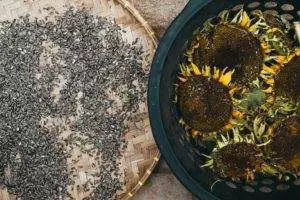
Traditionally, the seeds are cooked inside their shells, and the shells are left on, which helps them stay fresh longer (about six months), but it also means that they take longer to eat. This is why the habit naturally accompanies long, leisurely talks with friends and family. You can sit for hours, cracking the seed casings open with your teeth one by one, enjoying an activity that occupies your hands and mouth, without actually eating too many seeds.
According to TCM nutrition guidelines, sunflower seeds belong to the category of bitter foods, and are fairly neutral, in terms of yin and yang energies. Baking or frying seeds adds more heat energy, while boiling helps preserve the nutrients better. Sunflower seeds are high in fat, which is what makes them so tasty, so do be sure to enjoy them in moderation, with only a light sprinkling of salt, and lots of good, easy-going conversation!
Best Wishes From All of Us at Art of Wellness
There are many ways to wish friends and loved ones a Happy New Year in Chinese. This year, we want to say to all of our patients and friends: 祝财运亨通 Zhù cáiyùn hēngtōng! I want to wish you longevity and health!
*This article is for education from the perspective of Traditional Chinese Medicine only. The education provided by this article is not approved by FDA to diagnose, prevent, treat and cure human diseases. It should not stop you from consulting with your physician for your medical conditions. Traditional Chinese Medicine is based on Qi, which is an invisible force that usually cannot be observed by modern science. Because science focuses on testing ideas about the natural world with evidence obtained through observation, these aspects of acupuncture can’t be studied by science. Therefore acupuncture and Chinese herbs are often not supported by double-blind, randomized trials, and they are considered alternative medicine therapies in the United States.
How to Treat Allergy With Acupuncture and TCM
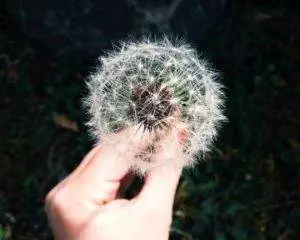
By Xiaomei Cai, L.Ac., Ph.D., & Qineng Tan, L.Ac., Ph.D.
Sinus congestion, runny nose, watery eyes? Itchy skin problem or rashes? It may be seasonal allergies, or an allergic reaction to some specific food or chemical. Acupuncture and TCM herbs can not only help to relieve allergy symptoms, but help to strengthen the body’s immune defenses, so that it is less vulnerable to allergens in the environment.
An allergy is when your immune system produces an antibody response to some substance; it could be a reaction to a plant pollen, an insect venom, a chemical in the air, or some type of food. The body is perceiving the foreign substance as a threat and manufactures antibodies to fight against it. A runny nose (rhinitis), watery eyes, itches in different parts of the head and body, and sneezing are the body’s way of trying to throw off the triggering allergens. Allergies can also cause asthma, which is when the body reacts to triggers with inflammation in the lungs and bronchial tubes, leading to coughing, wheezing, and difficulty breathing.
At least 50 million Americans experience some form of allergy symptoms every year, and the number is growing. The ever-increasing amounts of food additives, chemical pollutants, and other triggers in the environment are causing more and more people of all ages to develop allergies. TCM and Acupuncture have been recognized for a while by the WHO as helpful modalities to relieve respiratory illnesses, including seasonal allergies, rhinitis, sinusitis, and allergy-related asthma.
Top 5 Types of Allergies

Different types of allergies create a variety of symptoms. Seasonal allergies only show up at certain times of the year, when a particular pollen or other natural trigger is abundant, while chronic allergies can flare up at any time.
- Pollen Allergies – these are often referred to as “seasonal allergies,” or “hay fever,” and are triggered by natural pollens given off by trees, weeds, grass, and flowers or mold spores, pet dander. These types of allergy cause sneezing and runny nose (rhinitis) and eye allergies, or itchy, watering eyes.
- Insect Allergies – these can refer to the types of acute allergic reactions people have to bug bites (mosquito bites or spider bites) or stings from bees or wasps. It can also refer to respiratory or skin reactions to exposure to dust mites or cockroaches in the home environment.
- Skin Allergies – these include acute skin allergies like the hives or rashes caused by poison ivy or poison oak. They also include skin reactions to latex. Eczema is a more chronic skin allergy condition, where inflammation causes itchy patches of skin that can become very dry and scaly. Dermatitis or eczema often start in childhood. Flare-ups can happen due to external irritants, like certain soaps or detergents, fabrics, ingredients in topical ointments or lotions, or smoke in the air. Stress is also a contributing factor to eczema.
- Food Allergies – food allergies are especially common in children, with over 5% of children in the U.S. diagnosed in recent years. Certain types of nuts, dairy, soy, wheat, and shellfish are the most common food allergens. In some cases, food allergies are so severe that exposure can lead to a life-threatening reaction of anaphylaxis, an emergency situation in which blood pressure can slow down dramatically, and a person may have severe difficulty breathing. Every year, 200,000 people seek emergency medical care for a severe food allergy reaction.
- Drug Allergy – many people have allergic reactions to certain types of medication, including antibiotics, anti-inflammatories, ACE inhibitors, anti-seizure medications, and even aspirin. The most common symptoms of an allergic reaction to medication are: hives or rash, fever, stomach upset, or asthma-like wheezing. A severe drug allergy can also cause anaphylaxis.
Allergy treatment first involves finding out exactly what allergens will potentially cause a reaction. Allergy testing helps determine what, specifically, is triggering the symptoms. Then, a person is encouraged to avoid this trigger as best they can. Many people try over the counter antihistamines, decongestants, and nasal sprays to help manage their allergy symptoms. For more severe allergies, doctors may prescribe corticosteroids in spray, pill, or ointment formulations. Epinephrine injections are necessary to stop severe reactions and prevent anaphylactic shock.
Immunotherapy is an option for some people with a chronic allergic condition. A small amount of the allergen is introduced into the body either via injection (allergy shots) or in a sublingual (under the tongue) form. These can help people build us a better resistance to the allergy trigger over time.
How Can Acupuncture Help Seasonal Allergies?
Modern medical science has made many recent advances in understanding of the human body’s immune system. It is highly complex, and there is still much to learn. In TCM, we have for many centuries been aware of and observed what we call “Wei Qi,” which essentially means protective energy.

TCM always acknowledges dualities and the relationship between opposing and coordinating forces. In every case, we look for internal factors and external factors that are affecting the health of the person. In TCM, the immune system has both internal and external components. The external Wei Qi is a protective force that functions as a shield, blocking external pathogens like wind, dampness, and cold, from entering into the body. The lungs provide the energy to keep Wei Qi strong and especially to keep pathogens from entering through the nose and mouth. However, when Wei Qi is weak, it becomes easy for Wind to enter the head and bring with it other external pathogens, like cold, heat, dampness, or dryness.
According to TCM, a person who suffers from allergies generally has a deficiency of Wei Qi, making them more susceptible to invasions of Wind. Acupuncture treatment might focus, for example, on strengthening the lungs and spleen, which helps to build the Wei Qi back up. Herbal remedies can both relieve hay fever symptoms and rhinitis, and help to tonify the Wei Qi, so that allergic reactions will lessen over time.
One trial found that people were able to reduce their use of allergy medication after an eight-week course of acupuncture treatment for allergies. Another research study found that patients in a control group who received acupuncture reported better control of allergy symptoms during pollen season, with less reliance on antihistamines.
TCM and Acupuncture for Food Allergy
Recent research supports the efficacy of TCM herbs for helping to prevent severe reactions in people who suffer from food allergies. A specific formulation of eight Chinese herbs has been shown to be helpful for reducing the incidence of anaphylaxis in people with various types of food allergies, including milk, dairy, peanuts, tree nuts, and fruits. Herbal creams and herb bath preparations can also help prevent severe reactions, when used consistently for a course of treatment.
An acupuncture practitioner will also use their wide knowledge of nutrition to help patients with Celiac disease, food sensitivities and food intolerance manage their diet. Often, when dealing with allergies and sensitivities, it can be challenging to find what needs to be eliminated, as it is not always immediately obvious to a person which foods or other environmental factors are involved in creating the uncomfortable symptoms. Sometimes a chronic allergy is a sign of a candida infection. A TCM doctor will spend time looking carefully at all of the lifestyle behaviors involved and make appropriate recommendations to help remove hidden triggers.
Top 3 Tips to Help Allergies Naturally
Getting regular acupuncture “tune-ups” is one great, natural way to help relieve allergies. Here are some other ideas you can put into practice to help rid your home and work environment of potential allergens.
- Air Filter – a good-quality HEPA filter will remove particles of pollen, dust, and pet dander from the ambient air. This works best if you also make sure to keep the windows and doors closed when you suspect pollen is heavy in the air outside.
- Probiotics – a recent systematic review showed that taking probiotics can help reduce symptoms of allergic rhinitis. Probiotics help balance gut flora, which we now know is vital to proper immune functioning and prevention of inflammation.
- Wash Your Hands – Manage allergens that come home with you by washing your hands and putting your clothes in the laundry as soon as you get home.
Acupuncture Near Me for Allergy Relief
Seasonal allergies, food allergies, and allergies to chemicals and medication are all on the rise. While people are able to get some relief from conventional medications, TCM treatment offers a viable alternative without the possible side effects of these medicines. Acupuncture can help reduce the need for emergency treatment for severe allergic reactions, and also help prevent hay fever from recurring, year after year. Partner with an acupuncturist near me for allergy treatment now to ensure that when allergy season rolls around again, you are prepared with a strong defense.
*This article is for education from the perspective of Traditional Chinese Medicine only. The education provided by this article is not approved by FDA to diagnose, prevent, treat and cure human diseases. It should not stop you from consulting with your physician for your medical conditions. Traditional Chinese Medicine is based on Qi, which is an invisible force that usually cannot be observed by modern science. Because science focuses on testing ideas about the natural world with evidence obtained through observation, these aspects of acupuncture can’t be studied by science. Therefore acupuncture and Chinese herbs are often not supported by double-blind, randomized trials, and they are considered alternative medicine therapies in the United States.